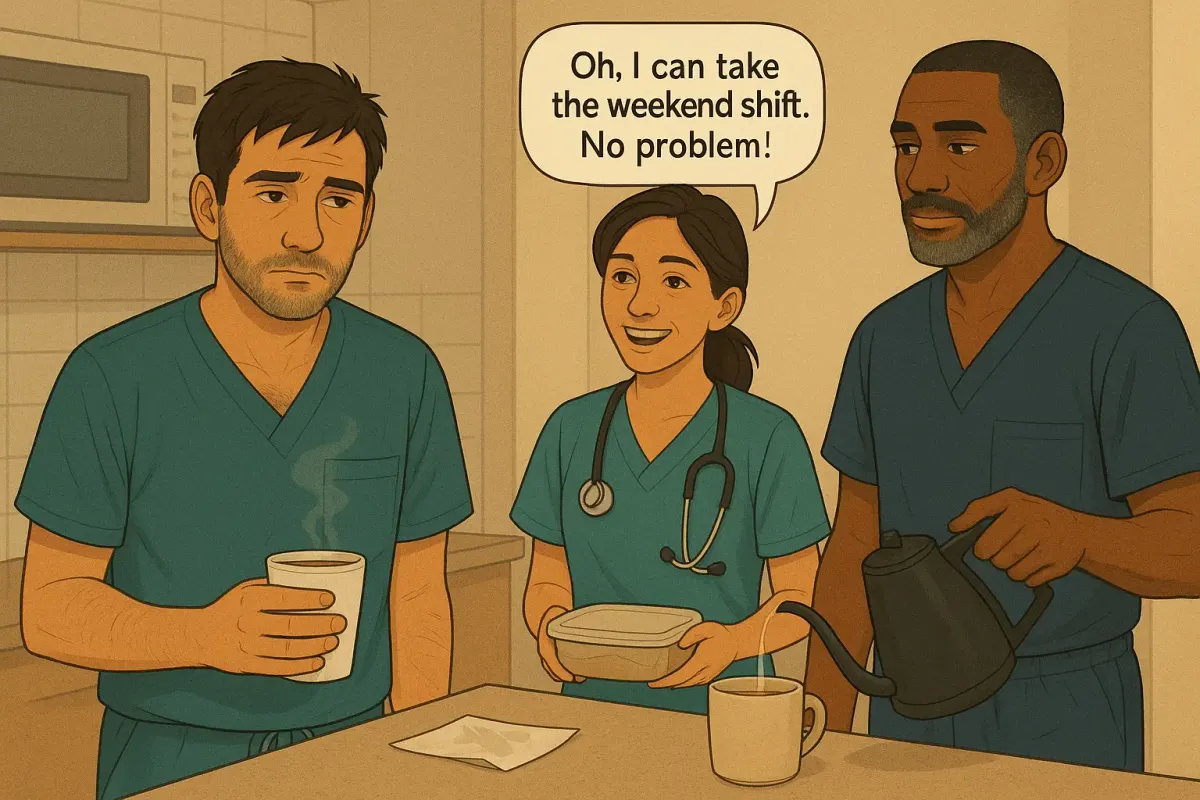From the Soul on Call series
Note: These reflections are fictional and intended for educational and reflective purposes only. They are not medical advice, are not based on any specific individual, and do not represent the views of any employer or institution.
The coffee was burnt again.
Not in a dramatic, smoldering-ruins way. Just enough bitterness to remind Dr. Solan Call that he was, in fact, still in a hospital.
The styrofoam cup steamed faintly in his hand as he leaned against the scratched countertop of the fourth-floor call room kitchenette—fluorescent lights buzzing like they were trying to get out.
He was still in scrubs. Still hadn’t peed. The world had that flattened, dreamlike haze unique to post-call mornings: too bright, too sharp, yet somehow wrapped in gauze.
He watched someone attempt to clean a spill with a single paper towel. Futile. Heroic. Medicine in miniature.
That’s when he heard it.
“Oh—I can take the weekend shift. No problem!”
Dr. Nora Boundarie. Smiling too hard, eyes too bright, standing by the microwave with her badge clipped to her chest like a merit badge in self-sacrifice.
Her ponytail was a little crooked, her mascara slightly smudged, but her tone was crisp and buoyant. Her sneakers were frayed at the heel—broken in from long, unplanned hours.
She said it like someone offering to water your plants. As if covering a 24-hour stretch were an act of spontaneous generosity. Like splitting an almond croissant.
Solan blinked. He wasn’t sure if he felt admiration or concern. Possibly both, filtered through a mild arrhythmia from caffeine and cortisol.
He knew Nora. Brilliant, tireless, beloved by admin. The kind of doctor who replied to emails at 11 p.m. with “happy to help!”
She never complained. Never left a task unfinished.
Once, she’d stayed late to reorganize the call schedule when someone’s cat got sick. She called it “just smoothing things out.”
Solan took a sip of bitter coffee and tried not to grimace.
Something stirred in his gut—not quite nausea, not quite guilt. More like the emotional version of oversteeped tea: murky, astringent, hard to place.
Nora turned toward him, still smiling.
“What about you, Solan? You free Sunday?”
There was no malice in her voice. Just that bright collegiality that left no room for dissent.
Saying no would feel like declining a birthday invitation. Or worse—like admitting fragility.
He hesitated.
The pause stretched.
A bead of sweat worked its way down his back, pooling in the purgatory between his undershirt and scrub top.
“Ah—my wife and I have plans,” he said, voice a little too casual, like he had just remembered he was married.
“Oh, of course!” she said quickly. “Totally get it.”
Her smile flickered—just for a moment. A microscopic shift.
Then she turned back to the microwave, grabbed her Tupperware, and walked out with a wave.
Solan stared at the floor.
His stomach buzzed.
His body felt both heavy and unanchored, like he might drift up and collapse simultaneously.
“You okay?” came a voice beside him.
He turned to see Dr. Ray Diant standing there with his usual unbothered calm—hydrated, alert, somehow smelling faintly of cedar.
Solan hadn’t even heard him enter.
“Fine,” Solan said reflexively, then immediately hated himself.
Ray raised an eyebrow and reached for a ceramic mug—his own, of course. He didn’t use the hospital’s styrofoam. He brought tea.
The kind with leaves.
“I saw the Nora thing,” Ray said, pouring hot water. “Classic.”
Solan half-shrugged.
“I mean,” Ray went on, “there’s noble. And then there’s… self-evaporation.”
Solan exhaled sharply through his nose. A puff of irony.
“She’s just trying to help.”
Ray nodded.
“Yep. And you’re just trying not to disappoint her.”
Solan looked at him.
“I said no.”
Ray smiled slightly.
“You said it like you owed her a PowerPoint.”
Solan’s throat tightened.
They stood in silence while the microwave beeped faintly from down the hall.
Somewhere, another shift had already begun.
Solan pictured himself saying yes. He saw it clearly: the quiet resentment, the tired conversation with his wife, the creeping guilt for needing rest, the mental rehearsals of invisible justifications.
He imagined standing in this same kitchen next week, even more depleted, unsure why he kept doing any of it.
“I used to think saying yes made me reliable,” he said, surprised at his own words.
Ray sipped his tea.
“And now?”
Solan stared into his coffee, now lukewarm.
“Now I think it just made me… available.”
Another silence. But this one felt softer.
Down the hallway, a pager buzzed faintly.
Someone answered it.
Not him.
As he left the kitchenette, he passed Frankie Whirl, leaning against the stairwell, caffeinated energy already in full spin. She grinned at him, half-mock salute, before darting upstairs.
He watched her go. A flash of momentum.
And for once, he didn’t feel the need to catch up.
🌱 Still with me?
If you've ever said "yes" when you meant "maybe not," this week's Soul Kit might resonate:
The Polite Yes
It’s not about fixing your boundaries—just noticing where they’ve quietly slipped.
Want to keep going?
One email a week with the latest story and Soul Kit.
